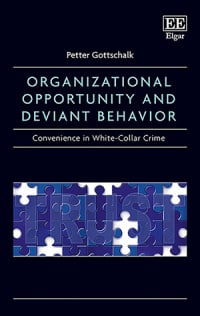Hardback
Organizational Opportunity and Deviant Behavior
Convenience in White-Collar Crime
9781788111874 Edward Elgar Publishing
Ever since Sutherland coined the term ‘white-collar crime’, researchers have struggled to understand and explain why some individuals abuse their privileged positions of trust and commit financial crime. This book makes a novel contribution to the development of convenience theory as a framework to understand and explain ‘white-collar crime’.
More Information
Critical Acclaim
Contents
More Information
Ever since Sutherland coined the term ‘white-collar crime’, researchers have struggled to understand and explain why some individuals abuse their privileged positions of trust and commit financial crime. This book makes a novel contribution to the development of convenience theory as a framework to understand and explain ‘white-collar crime’.
The framework integrates well-known theories from criminology, management and other fields to explain the occurrence of offenses. It is found that autobiographies indicate a strong presence of neutralization techniques in the behavioral dimension of convenience theory, while internal investigations indicate a strong presence of organizational opportunities to commit ‘white-collar crime’. Survey research, on the other hand, is found to indicate a strong belief that chief executives sometimes have the motive to commit financial crime in times of crisis, in times of great challenges, and in times of greed. The book concludes that the only feasible avenue to combat this type of crime is to make it less convenient.
This book will appeal to criminology and criminal justice students at both bachelor and master levels, as well as those studying business and law. Practitioners, including consultants in global auditing firms, attorneys and police academy students will also benefit from the overview of convenience theory research.
The framework integrates well-known theories from criminology, management and other fields to explain the occurrence of offenses. It is found that autobiographies indicate a strong presence of neutralization techniques in the behavioral dimension of convenience theory, while internal investigations indicate a strong presence of organizational opportunities to commit ‘white-collar crime’. Survey research, on the other hand, is found to indicate a strong belief that chief executives sometimes have the motive to commit financial crime in times of crisis, in times of great challenges, and in times of greed. The book concludes that the only feasible avenue to combat this type of crime is to make it less convenient.
This book will appeal to criminology and criminal justice students at both bachelor and master levels, as well as those studying business and law. Practitioners, including consultants in global auditing firms, attorneys and police academy students will also benefit from the overview of convenience theory research.
Critical Acclaim
‘What is particularly inspiring by this work is that it looks at white-collar crime proactively as opposed to reactively, something that legal scholars sometimes fail to do. In this regard, this book’s use of convenience theory provides a new landscape for evaluating this criminality.’
– Ellen S. Podgor, Criminal Law and Criminal Justice Books
‘While Edwin Sutherland has been credited with initiating the theoretical examination of white collar and economic crime, Petter Gottschalk, through this book and his many articles, has established himself as the contemporary and premiere expert in this matter. This enlightening book will allow criminal justice practitioners and researchers, criminologists, sociologists, government leaders and others interested in the field of financial crime to better grasp the underlying causes, theoretical explanations and practical solutions for this all too common, but highly underreported, criminal behavior.’
– James F. Albrecht, NYPD Captain (ret.) and Professor, Pace University (NYC), US
‘A comprehensive and insightful analysis of the complexities surrounding the causes, consequences, and control of individual level white-collar crime and organizational level corporate crime. Situating his analysis in convenience theory, Gottschalk summarizes and synthesizes an enormous body of literature from both American and European researchers and presents original case studies of white-collar crime in Norway that are sure to be of value for white-collar crime scholars and students worldwide.’
– Michael L. Benson, University of Cincinnati, US
‘This innovative exposition explains white collar crime to be a convenient option for perpetrators and as driven by financial desire, organisational opportunity and deviant behaviour. It deserves to be read.’
– Colin C. Williams, Sheffield University Management School, UK
– Ellen S. Podgor, Criminal Law and Criminal Justice Books
‘While Edwin Sutherland has been credited with initiating the theoretical examination of white collar and economic crime, Petter Gottschalk, through this book and his many articles, has established himself as the contemporary and premiere expert in this matter. This enlightening book will allow criminal justice practitioners and researchers, criminologists, sociologists, government leaders and others interested in the field of financial crime to better grasp the underlying causes, theoretical explanations and practical solutions for this all too common, but highly underreported, criminal behavior.’
– James F. Albrecht, NYPD Captain (ret.) and Professor, Pace University (NYC), US
‘A comprehensive and insightful analysis of the complexities surrounding the causes, consequences, and control of individual level white-collar crime and organizational level corporate crime. Situating his analysis in convenience theory, Gottschalk summarizes and synthesizes an enormous body of literature from both American and European researchers and presents original case studies of white-collar crime in Norway that are sure to be of value for white-collar crime scholars and students worldwide.’
– Michael L. Benson, University of Cincinnati, US
‘This innovative exposition explains white collar crime to be a convenient option for perpetrators and as driven by financial desire, organisational opportunity and deviant behaviour. It deserves to be read.’
– Colin C. Williams, Sheffield University Management School, UK
Contents
Contents: Introduction 1. Convenience in White-Collar Crime 2. Economical Dimension of Convenience Theory 3. Organizational Dimension of Convenience Theory 4. Behavioral Dimension of Convenience Theory 5. Empirical Study of White-Collar Criminals 6. Student Survey on Convenience Theory 7. Whistleblowers as Information Sources 8. Corporate Social Responsibility 9. Testing Convenience Theory 10. Sample of US Investigation Reports Conclusion Index




